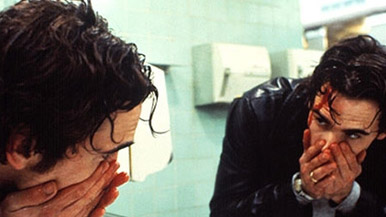Viking Night: Drugstore Cowboy
By Bruce Hall
June 11, 2013
BoxOfficeProphets.com

It’s a living, even if it's not much of a life.
Eventually a small time pusher named David follows the gang home, eager to join the circle of trust. The deal gets awkward, and it’s obvious that the labyrinth of bullshit required to maintain a healthy drug habit, plan a crime spree, cheat your friends and hide from the police is taking a toll on everyone. Also, in his zeal to throw the cops off his trail, Bob masterminds a clever prank that goes off the rails when a cop gets shot. This brings us to an important career tip for anyone considering the dark side of the pharmaceutical arts - the only thing worse than a dozen cops on your ass is a dozen angry cops on your ass.
But by far the worst part of being a drug addict is the hexes. When something goes wrong, smart people don’t waste time looking inward for answers. Instead, they undergo an extensive process of obsessive compulsive trial and error, whereby they are able to pinpoint the exact source of the bad luck and eliminate it. Nadine is thoroughly briefed on the process, such as the hexes that come with dogs (they can lead the cops straight to you), and the one about leaving a hat on your bed. Unimpressed, Nadine openly flouts the Hat Hex, which leads to such a monumental catastrophe that it starts Bob thinking about going clean. But walking away from the drug life means walking away from not just old habits, but old friends, lovers and enemies.
That's not easy to do, and Drugstore Cowboy offers a refreshingly droll take on it. It would be all too common for a “drug movie" to treat its characters with abusive contempt. But this one largely reserves judgment, offering instead a fairly objective view of what it's like to live your life from fix to fix, and how it comes to define every aspect of your existence. Dianne is an attractive woman who has certain needs, but Bob can hardly be bothered to fulfill his marital duties because even when he's not jonesing...he's jonesing. And sadly, nobody ever realizes that the reason Nadine is a bad junkie isn't because she's stupid, but because she's better than this, and they punish her mercilessly for it.
Even detective Gentry - Bob's nemesis, who's apparently made a career out of hunting him - develops a kind of detached empathy for his enemy. It’s faintly comical, but also sad. At each crime scene the police see the work of rodents, unable to curb their behavior without the benefit of capture, or the sweet release of death. But we get a front row seat; a window into the once fertile mind of a drug ravaged desperado who isn't concerned with death, because death is less painful than a life without drugs. Addiction is no longer the problem; drugs are as necessary to survival as food and water, and asking him to give it up is as absurd asking yourself to just stop going to the bathroom. In some ways, the hard core junkie might be more at peace with the inevitability of death than clean and sober folk who spend their lives studiously avoiding the issue.
Drugstore Cowboy is often called Gus Van Sant's “breakout film,” and it is - but not many artists can say their creative identity was so well honed this early in their career. No, this isn't a groundbreaking movie, but it is made and delivered with authority, and its story is told with such an unmistakably clear stylistic voice, you'd almost think it was autobiographical. It's not, of course. It's based on a book - but I'll spare you the traditional pretense of pretending I've read it. But Van Sant definitely helped write the screenplay, and regardless of whether it hews to the novel or not, it feels deeply personal and it's hard not to believe you're seeing great talent applied firmly within its element. We don't need someone to tell us that drugs are bad, or that people who get hooked on them are in big trouble. This we know, but I suspect there’s more to the message than the obvious.
A suggestion could be made that this movie isn't about drugs so much as it's about problems, and the human capacity to rationalize them. Most of us don't consciously choose our problems, but most of us find the strength to overcome them hard to come by, whether they actually involve heroin or not. When you're that close to an issue, looking inward is hard. It's easier to develop a succession of personal, hand crafted obstacles to self improvement, whether they actually involve hats or not. Or, maybe I'm full of crap. The point is, that's one of the things that really good movies can do - get you to see something obvious about yourself by putting you behind someone else's eyes. I don’t claim to know what all the ingredients are, but I know it when I see it - great talent, applied firmly within its element.